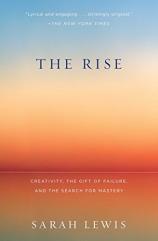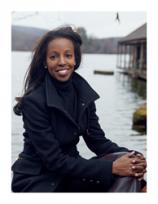The Rise: Creativity, the Gift of Failure, and the Search for Mastery
Review
The Rise: Creativity, the Gift of Failure, and the Search for Mastery
There are many famous achievements noted in THE RISE, but the most salient point about failure and what it provides the person who has failed in a particular endeavor comes from a member of Scott’s failed Arctic bid, Navy Explorer George Nares: “It is true that we failed to bring home the North Pole as a national present to the world, but those who regret that circumstance may be consoled with the knowledge that failure implants more deeply in all breasts the desire to excel.” THE RISE attempts to make the case that the lessons learned from spectacular failures can only enhance and support the masterpieces that come when anyone is forced to confront the bad and reconstruct an idea into its inevitable success.
Sarah Lewis doesn’t have a huge history with failure herself. She has a BA from Harvard, a Masters of Philosophy from Oxford, and is getting a Ph.D. from Yale this year. She has been a curator at the Tate Modern and MOMA in New York. She was on Obama’s Arts Policy Committee, on Oprah’s “Power List” and a Critic at the Yale University School of Art in the MFA program. Is it possible for someone this accomplished (and under 40) to really understand what failure is for most people? Well, Lewis doesn’t bother with any stories about ordinary people. Instead, she fills the book with tales from those who, despite searching for success at some point in their lives, found huge fame and accolades later on after a period of reconstruction and reinvention.
"Turning failure on its back and dissecting the particulars can take us into the next realm of our growth and expression. Lewis thinks it’s possible, and after reading THE RISE, I have to say I believe her."
Mythmaker J.K. Rowling, choreographer Paul Taylor and activist Frederick Douglass are all examples of famous personages who suffered the slings and arrows of fate, who survived periods of lowdown depression and endless negative reinforcement only to take those anger-inducing, frustrating circumstances and turn them into lauded achievements later on. Lewis believes that this type of resilience is possible for anyone and that these examples serve to prove that it is truly possible to recreate oneself or one’s work into something that will find purpose in the greater world.
One of the things that brings Lewis’s sources to this point after a situation that would cause most people to run for cover and never try again is what she refers to as “grit.” The resilience to take failure and continue moving towards a goal, by rethinking the original plan or just going forward with a new project in the face of past failure, requires a certain mindset. Lewis says, “Grit is a portable skill that moves across seemingly varied interests. Grit can be expressed in your chosen pursuit and appears in multiple domains over time. It can be expressed through the pursuit of painting, and then through the invention of the telegraph.” Switching course and finding new ways to attempt your particular adventure is a necessary but learnable skill that helps people meet their potential. She spends a good part of the book discussing how other theorists agree that training kids to excel in “grit” would be a progressive step in truly preparing the young for inheriting our flawed world.
Lewis writes like an academic; this is no cozy Dr. Dyer book with everything boiled down to simplistic platitudes that would find refuge on cat posters. It is a very thoughtful look at turning lemons into lemonade. Turning failure on its back and dissecting the particulars can take us into the next realm of our growth and expression. Lewis thinks it’s possible, and after reading THE RISE, I have to say I believe her.
Reviewed by Jana Siciliano on March 21, 2014
The Rise: Creativity, the Gift of Failure, and the Search for Mastery
- Publication Date: March 17, 2015
- Genres: Nonfiction, Psychology
- Paperback: 272 pages
- Publisher: Simon & Schuster
- ISBN-10: 1451629249
- ISBN-13: 9781451629248





